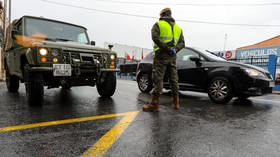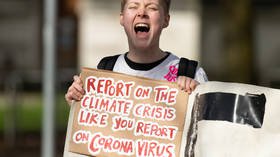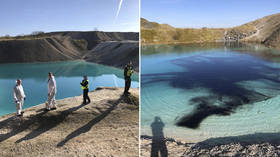What will 6 months of Covid-19 do to our society? Only certain thing is we'll be in a state... and the STATE will be IN CONTROL

Predicting the future is always notoriously difficult. The unprecedented response to the Covid-19 crisis means most bets are off on what may happen, apart from reinforcing the idea there is no alternative to state intervention.
Albert Einstein famously quipped that he never thought about the future because it came soon enough. He might have been a genius, but he didn’t experience the coronavirus crisis – and thus could not imagine a time when society would be so obsessed with thinking about the future.
There are a number of difficulties with trying to anticipate what society might be like after this crisis. In the first instance, we have no idea how long this will go on. Experts disagree. Some suggest lockdowns could be relaxed in three months. The UK government is now planning on at least six months. In each case, the outcomes could be significantly different.
Second, whatever happens in the future we can be sure there will be continuities and disruptions, and destructive and constructive dynamics at play. Crises are never one-way streets.
But – and this is critical – the coronavirus crisis will not bring year zero, a new era or clean slate in which what happened in the past will disappear or can be ignored. Nor will pandemics be the new normal. The exceptional peacetime actions taken by governments and central banks, and the reorganisation of society and the economy around lockdowns – which is inducing some behavioural changes – are temporary, not permanent.
But the consequences, particularly of the unprecedented global state bailout which the Financial Times estimates to be around $4.5tn, will have a direct bearing on the future and in different ways.
The increased role of the state in the economy and society is the one definite in a sea of uncertainty. In the UK the government has promised loans and grants to businesses worth £330bn, and basic pay for company employees who are left workless. The Treasury is propping up wage support, grants, tax holidays and loan guarantees. It has relaxed banking regulations to ensure lenders can provide £190 billion of extra credit, and the authorities are using moral suasion to conscript them into the Covid ‘war effort’ and back small businesses. Even despite this, it is estimated that at least a fifth of small businesses will collapse.
With echoes of a wartime command economy, ministers are coordinating supermarkets to distribute food and manufacturers to make ventilators. This might evoke wartime parallels, but the analogy is inapt.
Why? Because in real global wars, capital is destroyed and forced to restructure, which creates the conditions for renewed growth. The post-war boom demonstrated this all too clearly in the 20th century.
In the coronavirus ‘war’, however, state spending and mobilisation are geared towards propping up pre-existing stagnation. And this is what is being studiously ignored in the many fantasies being suggested as heralding the future.
Also on rt.com The US was named the best equipped country to deal with a pandemic not a year ago — what happened there?Claims that this crisis is forcing traditional business to embrace the digital age, for example, are merely highlighting how vacuous the claims made by many are that we have been in a new fast-moving age of disruption and innovation. The fact that some old-line industries – from media and entertainment through retail to food and beverages – are having to go online to survive the lockdown highlights how stagnant, not innovative, so much of our economy has been, and remains.
The idea, too, that people working from home represents the future world of work is another make-believe forecast. While this may appeal to doomsday environmentalists – less commuting means less congestion, less pollution and lower CO2 – the real issue is what work they might be doing, rather than the fact that it is at home. Is it productive or decorative?
The so-called coronavirus war has revealed another less-acknowledged reality of the stagnant economy: namely that many essential jobs in our society are unskilled or semi-skilled, and that we depend more on these than the much-hyped white collar ‘information’ or service workers. How much difference would it make if many of the latter jobs simply disappeared? But the absence of construction, agricultural, transport, delivery, and indeed health workers, to name a few, brings home the fact that even in the ‘digital age’, we depend upon material production in sectors that have suffered decades of stagnation, non-investment and non-innovation.
Even some highlights of the current crisis, like ‘Project Pitlane’ – the collaboration of seven F1 engineering teams based in England to rapidly develop a continuous positive airway pressure breathing device – should not be over-hyped. Without diminishing the accomplishment, we should soberly reflect on the fact that the best of British engineering has re-engineered an existing off-patent device, not created a breakthrough in health care.
‘Project Pitlane’ speaks to something quite critical about the future. The immediate crisis has made the world unfamiliar. But yesterday’s ideas have not disappeared. Wokeness, identity politics, inter-generational conflicts, and the culture of low expectations, will be back with a vengeance.
More importantly, the risk-averse culture of precaution around climate change in particular will be larger than life. Why? Because what people have seen in the behaviour of the state – particularly the disbanding of the rule book of fiscal responsibility – will raise the obvious question: “If all this is what was necessary to deal with Covid-19, what about the climate emergency?” After all, Covid-19 accomplished what Greta and Extinction Rebellion were advocating: shut down schools, stop flights, stop people driving cars, reduce our carbon footprints, stop fossil fuel exploitation, etc.
And this is surely the point about the future. While the economic consequences are going to be felt for generations to come, the more immediate effect will be its political impact.
What Covid-19 has already accomplished is the final nail in the coffin of the phoney post-war ideological battle between free-marketeers and state ‘socialists’. Already the banners flying in society have inscribed “There is no alternative to the State,” following Margaret Thatcher’s famous dictum ‘There is no alternative to the market’ after the collapse of the Soviet Union in 1989.
When Howard Davies, the chairman of Royal Bank of Scotland, jokingly quipped in the Financial Times that “if the government said it was nationalising all the UK’s shoe shops, people would regard it as entirely plausible,” he was not exaggerating.
There has been no argument. There has been no political debate. But the state has won, and everything else will follow. If we thought yesterday’s tendency towards technocracy was strong, we haven’t seen anything yet. The authoritarian trends already on display in the current lockdown are perhaps a harbinger of a future society run along managerial principles.
But crises are never one-way streets. The examples of social solidarity we have seen suggest there are other forces at play that may positively influence the future. This remains an unknown. But the renewal of the role of the state is not. We do not need to speculate about its future; it has already arrived.
Think your friends would be interested? Share this story!
The statements, views and opinions expressed in this column are solely those of the author and do not necessarily represent those of RT.
















